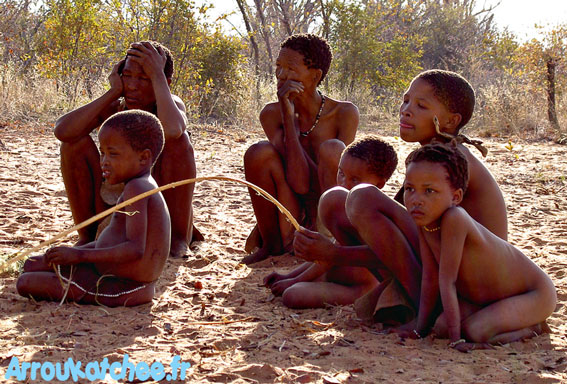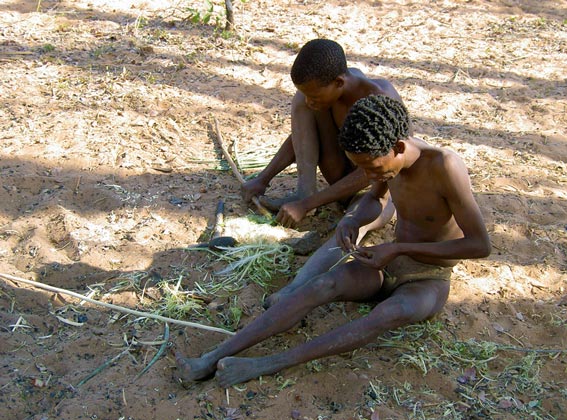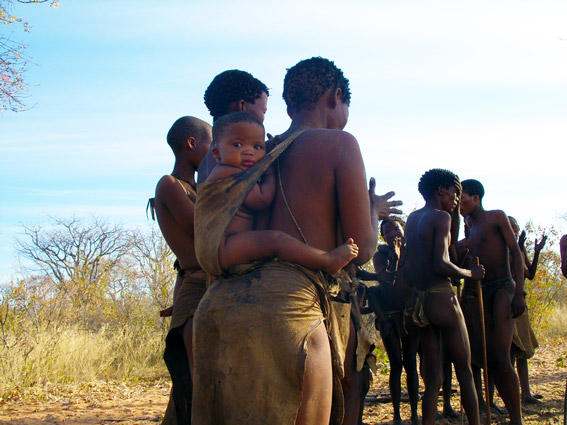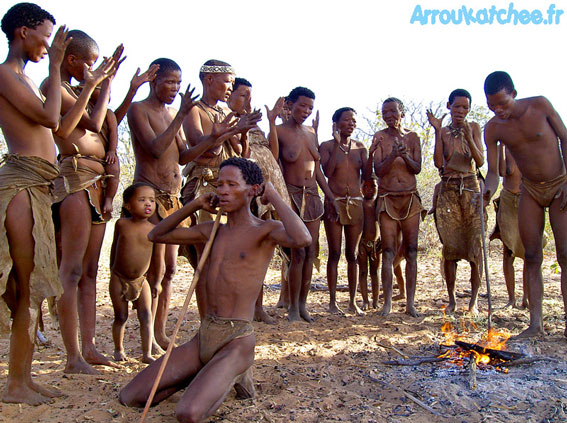|
|
Introduction
The Bushmen are the oldest inhabitants of Southern Africa where they lived for at least 20,000 years.
Their habitat is the vast desert of the Kalahari and Bushmanland.
They are defined as "those who follow the lightning" moving based on rainfall to feed on fruit, roots and game.
Today, the Bushmen have largely been able to maintain a traditional lifestyle.
 Bushmen of Namibia
Bushmen of Namibia
They are grouped in small villages of huts in the vast plains of Bushmanland.
Namibia still has 27 000 Bushmen (or Bushmen) representing 3% of the total population, Botswana (55 000) and South Africa (10 000).
They are neither black nor white, and rock carvings that testify They occupied the country for thousands? Years, well before arrival of all other peoples, especially the Bantus, who have emerged that from the fifteenth century.
Only some 2,000 Bushmen maintain Today, as the hero of 'Gods Must Be Crazy ", their ancestral way of life, in the Kalahari Desert in East of the country. They only have what they can carry, using poisoned arrowheads for hunting, and transport layer of water in eggs of ostrich empty.
Like their cousins, the Hottentots, the Nama , and Damara , the Bushmen speak a language of "clicks."
History
The designation was introduced Bushmen by the Boers (Dutch).
San is a name more politically correct and was introduced by Namaquas.
This nomadic hunter-gatherers once occupied all of southern Africa. The successive arrival of the Bantu, sedentary farmers, and livestock Hottentots living and speaking a language of the same family, has decimated the population and has pushed to land increasingly thankless.
 San people
San people
The arrival of the Dutch (Boers) and Huguenots in the seventeenth century and the British completed their reduced to misery by driving them from their ancestral lands.
In the eighteenth century, farmers would gather a militia (commando) who launched punitive expeditions on the Bushmen.
Now relegated to one of the most thankless land of the world, the Kalahari Bushmen may still need to clear off the ground admitted the government of Botswana to incorporate the benefits of civilization, but according to those involved, to leave way to the diamond exploration that would project the De Beers.
In 1991, Botswana Christian Council issued a report about a case involving suspected Bushmen to hunt on private property and were arrested and tortured by national park rangers.
In 1997, many were expelled from their homes in the Kalahari and those who stayed suffered drastic declines in their hunting territory, continual harassment and torture.
In early 2002, the harassment escalated: water pumps were destroyed, water supplies dumped into the wilderness and hunting and gathering prohibited.
Virtually all the Bushmen were then evicted from the CKGR but many of them have since returned to their lands and many others want to do the same.
 Bushman baby
Bushman baby
The reasons for the deportation highlighted differ greatly depending on the parties.
The Botswana government put forward the fact that the Bushmen were no longer living according to their traditions, raising livestock, and thus disturbed the ecological balance of the reserve.
The British NGO Survival International for its suspicion of interest related to the diamond mines.
In 2006, a Botswana court has recognized the illegality and unconstitutionality of the expulsion of the Bushmen of the animal sanctuary in the Central Kalahari.
The government does not seem inclined to facilitate their work, it has no obligation to restore basic services in the region (water).
In late 2007, the Bushmen in Botswana have announced they would go to a new government to court if they can return to their land.
Lifestyle and Culture
Bushman languages are Khoisan family.
They speak different languages, all of which incorporate clicks (consonants inspired) translated in writing by the signs! or | |.
The Bushmen are hunter-gatherers who, for thousands of years, have found their sustenance in the desert with their knowledge and skills.
They primarily hunt several species of antelope, but their daily food has always been primarily composed of fruits, berries and roots of the desert.
They construct temporary wooden shelters. Many of them have been forced from their territory and live in villages located in areas unsuitable for hunting and gathering.
 Bushmen people of Namibia
Bushmen people of Namibia
In Botswana in particular, they suffer discrimination and ostracism of Tswana society despite a settlement program launched by the government.
Rehoused in wretched camps or living on ranches where they work, the Bushmen are rejected and marginalized like the Australian Aborigines.
It lists 100,000 Bushmen in southern Africa as a whole today.
Some 3 000 Bushmen still living in the middle of the Kalahari, but in a nature reserve established by the Botswana government.
They continue their nomadic life, the last survivors of what archaeologists call the "arc of civilization."
The others are settled.
Their works (whether war scenes & hunting) are painted on rocks.
Photos
Pictures of Bushmen people
Books
Journey with Bushmen people
|
|



